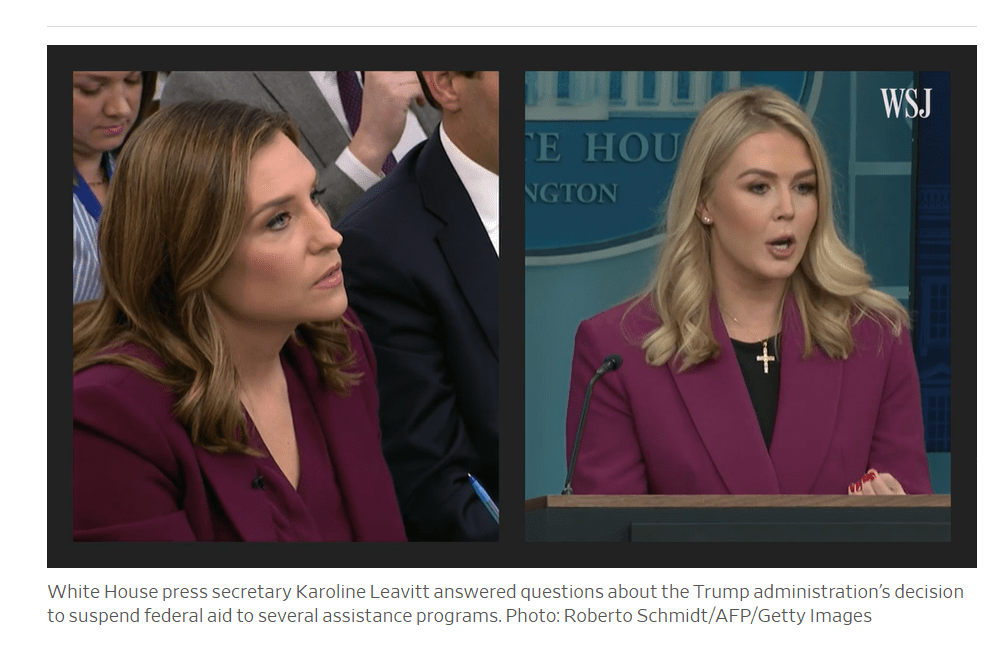Trump sought to pause billions of dollars in federal assistance. Payment systems froze.

A federal judge temporarily blocked a sweeping White House order that sought to pause billions in federal grants, loans and other financial assistance-programs, a memo that created chaos as states struggled to access funding federal-government portals dealing with Medicaid, emergency aid and low-income education and nutrition services.
Minutes before the White House order was set to take effect, U.S. District Judge Loren AliKhan in Washington, D.C., temporarily blocked federal agencies from taking steps to implement it. Ruling from the bench at the end of a hastily arranged court hearing Tuesday, AliKhan said she was issuing a brief stay that would “preserve the status quo” until she can hold an oral argument, which is set for Monday morning.
The administration spent Tuesday trying to contain the fallout from the Monday night memo. The initial directive noted exemptions to Medicare, Social Security benefits and assistance provided directly to individuals—but gave few other clues as to what it covered or didn’t cover. The lack of information prompted government officials, lawmakers, nonprofits and others to parse through the two-page document to agencies—down to the footnotes—to try to understand which programs would be halted.
Confusion was so widespread that OMB sent Capitol Hill staff an explanation Tuesday afternoon seeking to make clear to lawmakers that programs such as Medicaid and the Head Start preschool program would continue without delay, and that pauses for other programs might be as short as a day.
Despite the White House assurances, several states said they had difficulty accessing funding portals from the federal government for Medicaid, the federal health insurance program for low-income Americans, community health centers and other funding.
“Connecticut’s Medicaid payment system has been turned off. Doctors and hospitals cannot get paid,” Sen. Chris Murphy (D., Conn.) wrote on X.
Massachusetts Attorney General Andrea Joy Campbell said her state had tried to draw $41 million in Medicaid funds Monday and hadn’t been able to obtain it yet.
A group of 23 state attorneys general, including those in New York and California, said they planned to file a lawsuit later Tuesday seeking to stop enforcement of the funding freeze, which they called unconstitutional.
Aides on Capitol Hill said Republican lawmakers who write the annual spending bills weren’t given a heads-up about the unexpected OMB move.
Early Tuesday, the OMB sent a separate directive reviewed by The Wall Street Journal notifying federal agencies that they were required to fill out an attached spreadsheet answering a series of questions about programs that might require funding and whether they aligned with Trump’s agenda. One question asked if the program supports abortion “in any way.” The information requested information related to programs with funding or activities planned through March 15.
OMB said it might allow the ability to provide exemptions “on a case-by-case basis,” adding to the confusion among states. The temporary pause became effective at 5 p.m. Tuesday.
Dan Jacobson, a former OMB general counsel during the Biden administration, said the lack of clarity from the initial memo might have led agencies to go beyond what was intended.
“I assume that agency officials, because they’re afraid in the current environment of being perceived as running afoul of the president’s directives, will be overly cautious and err on the side of freezing funds if they’re unsure whether it’s covered by the directive,” Jacobson said.
Somehow I get the feeling I will have plenty of things to write about over the next four years.